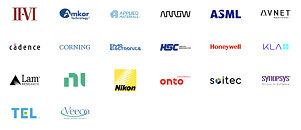Raevenlord
News Editor
- Joined
- Aug 12, 2016
- Messages
- 3,755 (1.22/day)
- Location
- Portugal
| System Name | The Ryzening |
|---|---|
| Processor | AMD Ryzen 9 5900X |
| Motherboard | MSI X570 MAG TOMAHAWK |
| Cooling | Lian Li Galahad 360mm AIO |
| Memory | 32 GB G.Skill Trident Z F4-3733 (4x 8 GB) |
| Video Card(s) | Gigabyte RTX 3070 Ti |
| Storage | Boot: Transcend MTE220S 2TB, Kintson A2000 1TB, Seagate Firewolf Pro 14 TB |
| Display(s) | Acer Nitro VG270UP (1440p 144 Hz IPS) |
| Case | Lian Li O11DX Dynamic White |
| Audio Device(s) | iFi Audio Zen DAC |
| Power Supply | Seasonic Focus+ 750 W |
| Mouse | Cooler Master Masterkeys Lite L |
| Keyboard | Cooler Master Masterkeys Lite L |
| Software | Windows 10 x64 |
Since lobbying is both legal and regulated in the US (an attempt to bring attempts of influencing political power by corporations under legal boundaries, as opposed to being done in the dark), it feels like it was only a matter of time before big tech attempted to join under one banner. As such, the Semiconductors in America Coalition (SIAC) has now been put together, and boasts of 64 members including Microsoft, Apple, TSMC, Intel, AMD, NVIDIA, Arm, and Samsung. It seems that all of these companies - which are often at odds with one another when it comes to competing for consumers' choice and money - have found enough similarities to get organized in an attempt to nudge political power in their favor.
SIAC said in a press release that its mission is to "advance federal policies that promote semiconductor manufacturing and research in the U.S. to strengthen America's economy, national security, and critical infrastructure." The first announcement from the SIAC following its foundation was its intention to support the CHIPS for America Act. The Act (supported by The Semiconductor Industry Association (SIA) and President Joe Biden) has already been approved by the House and the Senate as part of the National Defense Authorization Act for 2021 but has not yet been funded. It seems that SIAC's first mission is to get the government to open up its $50 billion-deep pockets.

The Coalition penned a letter to US Congressional Leaders: "The current shortage of semiconductors is impacting a broad range of industries throughout the economy. To address this problem in the short term, government should refrain from intervening as industry works to correct the current supply-demand imbalance causing the shortage. But for the longer term, robust funding of the CHIPS Act would help America build the additional capacity necessary to have more resilient supply chains to ensure critical technologies will be there when we need them. Manufacturing incentives funded by Congress should focus on filling key gaps in our domestic semiconductor ecosystem and cover the full range of semiconductor technologies and process nodes - from legacy to leading-edge - relied on by industry, the military, and critical infrastructure."




View at TechPowerUp Main Site
SIAC said in a press release that its mission is to "advance federal policies that promote semiconductor manufacturing and research in the U.S. to strengthen America's economy, national security, and critical infrastructure." The first announcement from the SIAC following its foundation was its intention to support the CHIPS for America Act. The Act (supported by The Semiconductor Industry Association (SIA) and President Joe Biden) has already been approved by the House and the Senate as part of the National Defense Authorization Act for 2021 but has not yet been funded. It seems that SIAC's first mission is to get the government to open up its $50 billion-deep pockets.

The Coalition penned a letter to US Congressional Leaders: "The current shortage of semiconductors is impacting a broad range of industries throughout the economy. To address this problem in the short term, government should refrain from intervening as industry works to correct the current supply-demand imbalance causing the shortage. But for the longer term, robust funding of the CHIPS Act would help America build the additional capacity necessary to have more resilient supply chains to ensure critical technologies will be there when we need them. Manufacturing incentives funded by Congress should focus on filling key gaps in our domestic semiconductor ecosystem and cover the full range of semiconductor technologies and process nodes - from legacy to leading-edge - relied on by industry, the military, and critical infrastructure."




View at TechPowerUp Main Site





